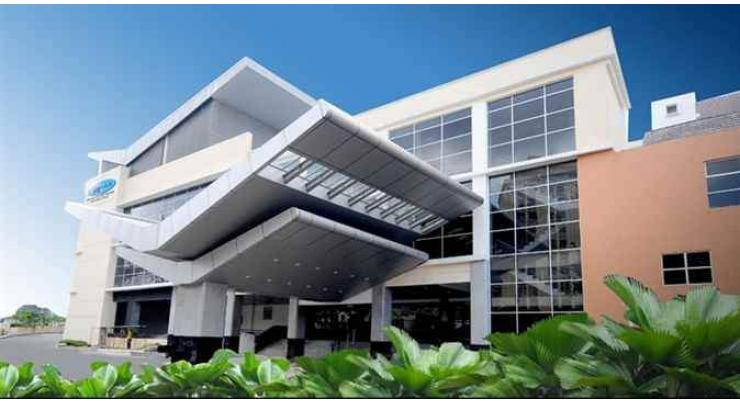
Malaysia's IJN Embarks On 7 Year Plan To Become Paperless Hospital
Mohammad Ali (@ChaudhryMAli88) Published October 16, 2018 | 05:34 PM

The National Heart Institute (IJN), a heart surgery centre in Kuala Lumpur, Malaysia, has budgeted RM45 million (US$1 = RM4.15) to carry out a seven-year plan to become a paperless hospital, says Chief Executive Officer Dr Mohd Azhari Yakub.
London, (UrduPoint / Pakistan Point News - 16th Oct, 2018 ) :The National Heart Institute (IJN), a heart surgery centre in Kuala Lumpur, Malaysia, has budgeted RM45 million (US$1 = RM4.15) to carry out a seven-year plan to become a paperless hospital, says Chief Executive Officer Dr Mohd Azhari Yakub.
By leveraging on the use of technology, the hospital embarked on the plan in 2015, aimed at providing cutting edge service to its patients.
He said the government-owned private hospital is currently entering its third year of the plan, and has, thus far, put in place several modules for technology imaging system, hospital system as well as financial system.
"Next year onwards, we are going to embark on electronic medical records or EMR, whereby this system will integrate the various modules that we currently have and we will eventually become a paperless hospital," he said, adding that this was the hospital's desire for the future, to integrate various existing systems in order to move forward in terms of patient safety, efficiency and cost containment.
Dr Mohd Azhari, who has been selected as an Outstanding Alumnus of the Oxford Advanced Management and Leadership Programme, is currently in London to receive the award on Friday.
Speaking to reporters accompanying Dr Mohd Azhari and his delegation on the trip, he said the hospital, established in 1992, aimed at empowering its patients in taking care of themselves in terms of making appointments from their own mobile phone as well as obtaining medical results from IJN.
He visited the Royal Papworth Hospital in Cambridge, which is a cardiovascular institute similar to IJN, to learn from the hospital's experience in implementing the EMR system.
The IJN delegation would also visit two other hospitals, one in London and another in Oxford, to learn more about the EMR and to seek collaboration in terms of research and clinical care.
"Once we implement the EMR, which is an integrator of the modules that we have, we can move on to other modules like the automated drug dispensing as well as scheduling, which are part of the information architecture plan," he explained.
On scheduling, he said the system, when implemented, would allow patients to choose an appointment time and date convenient to them.
Asked on the cost reduction in integrating the technology system, Dr Mohd Azhari said IJN had not set a target but said it was more towards meeting client expectation.
With increased efficiency and better patient experience, he was confident that IJN would be able to treat more private patients.
"Currently, a majority of our patients are from Indonesia, but we are seeing an increased number of patients from Myanmar and Vietnam.
"Moving forward, we hope to service more patients from the middle East and Bangladesh," he said, adding that the number of private patients seeking treatment at IJN was anticipated to increase to 50 per cent, over the next five years, from the current 30 per cent.
To date, IJN has up to 70 (local) specialists working with the hospitals in niche areas namely electrophysiologywhich relates to heart rhythm, heart failure, complex intervention and others.
Related Topics
Recent Stories

Robinson, bowlers help New Zealand go 2-1 up against Pakistan

Shahzeb Chachar to hold khuli kachehri on April 26

Heatwave amid Israel's aggression in Gaza brings new misery, disease risk

Tourism must change, mayor says as Venice launches entry fee

Court adjourns Judicial Complex attack case till May 17

Nasreen Noori’s book ‘Popatan Jahra Khwab’ launched

Wafaqi Mohtasib inspection team visits Excise and taxation office

AJLAC announces 5th Conference titled ‘People’s Mandate: Safeguarding Civil ..

Pak-US officials engage to enhance trade, investment ties

IBCC to promote educational excellence, expand regional presence

Pakistani 'Blue Helmets' serving UN Peacekeeping Mission in DR Congo set to leav ..

Putin says plans to visit China in May
More Stories From Health
-

Vaccines save at least 154 million lives in 50 years: WHO
1 day ago -

UHS to issue MBBS degrees within three months after final result
1 day ago -

Rawalpindi woman gives birth to six babies
6 days ago -

DC calls for intensive anti-polio drive in ICT
7 days ago -

World Hemophilia Day observed to underscore importance of providing comprehensive care
8 days ago -

Six in a family with heart on the 'right side'
8 days ago
-

Diabetic disease increasing rapidly : Dr. Noor Elahi Memon
8 days ago -

World Hemophilia Day observed
8 days ago -

ATC dismisses bail petition of doctor involved in illegal kidneys transplant
16 days ago -

Dr. Shehzad warns against deviation from WHO guidelines on anti-smoking
16 days ago -

Health activists express concerns over attempts to derail tobacco control
18 days ago -

UHS declares MBBS first prof, MS urology exam results
27 days ago











